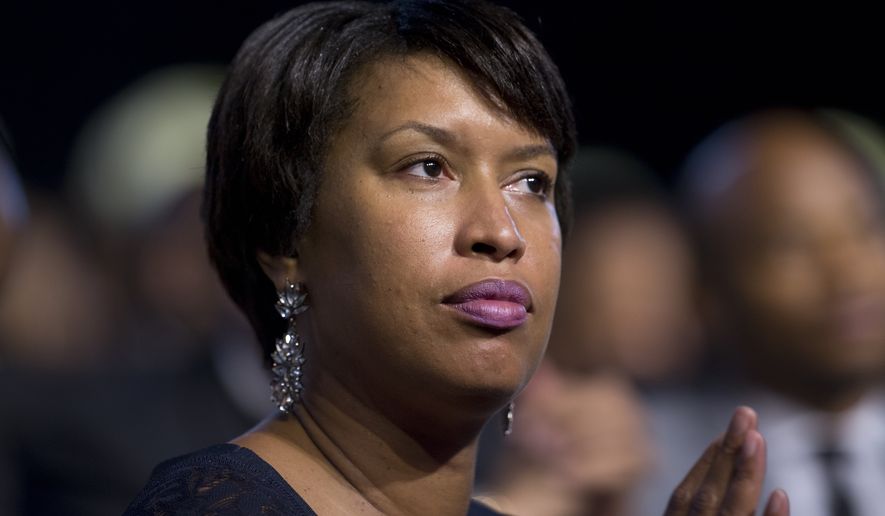D.C. Mayor Muriel Bowser offered little support Tuesday for a revised paid family leave bill, citing employment statistics showing the program would mostly benefit people who work in the city but live in Maryland and Virginia.
Through a spokesman, the Democratic mayor said she had not seen the legislation but was concerned that the District would foot the bill for paid family leave for the D.C. area.
“This is about fairness, and if we are going to raise a quarter of a billion dollars in new taxes each year, then D.C. families should be the primary beneficiaries,” said spokesman Kevin Harris. “Without the full details [Miss Bowser] remains concerned that the legislation does not go far enough in putting D.C. families first.”
D.C. Council Chairman Phil Mendelson, at-large Democrat, is expected to release the legislation this week.
The Universal Paid Leave Act of 2015 would provide 11 weeks of paid leave to city workers who have newborns or adopt babies and eight weeks for those who must tend to sick relatives. The program would be funded via a 0.62 percent payroll tax on about 8,000 city businesses and is estimated to cost $250 million a year.
The program would apply to all private-sector employees working in the city regardless of where they reside.
Of the 531,999 people who work in the city, about 195,000 live in the District. According to employment statistics, 201,981 city workers live in Maryland and 134,192 live in Virginia, meaning nearly two-thirds of the city’s workforce would receive — and likely spend — paid leave benefits outside the District.
Julius Hobson, a public policy lawyer at Polsinelli law firm, said D.C. residents could end up hurting if city officials enact the paid family leave bill, which would be the most generous program of its kind in the country.
“It’s not clear that there was a significant effort to narrow this down to people who live here,” said Mr. Hobson, a former D.C. government liaison to Congress. “I suspect businesses are going to move out of town to avoid tax. Who’s going to get hurt? The people who live here.”
The Home Rule Act allows Congress to strike down any law passed in the District, which usually is achieved by denying appropriations for a measure.
“Will business go to the Hill to lobby to bring this down? Given the results of the [general] election, my bet is yes,” Mr. Hobson said, noting that Republicans retained control of Congress and won the White House. “[Business owners] might get a positive reception for something like that.”
Such a move would be unprecedented for business owners in a city that usually tells Congress to keep its nose out of the District’s dealings and is making a push for statehood.
Under the paid leave bill, workers earning less than 1.5 times the minimum wage would receive 90 percent of their wages and those earning more than that would get 50 percent of their wages up to $1,000 per week, according to a staffer for Mr. Mendelson, who described details of the legislation to The Washington Times.
Ike Brannon, a fiscal policy fellow at the libertarian Cato Institute, credited Mr. Mendelson for putting thought into crafting an efficient program that caps benefits, making it “a little more egalitarian than it would otherwise be.”
But Mr. Brannon said that enacting the legislation would be a mistake.
“To suggest that it’s too small of a tax to matter may sound intuitively appealing, but the notion that costs do not really matter is becoming a tired trope,” he said. “One can argue about the degree of the impact, but to pretend firms can ’swallow’ costs ad infinitum is just facile.”
At-large council members Elissa Silverman and David Grosso, both of whom introduced the original 16-week version of the bill last year, have voiced full support for Mr. Mendelson’s scaled-down plan. However, Ms. Silverman regretted the loss of a provision that would have provided paid leave for workers’ personal medical issues.
The bill likely will get its first vote at the council’s Dec. 6 legislative meeting and would need a second vote of approval before year’s end.
• Ryan M. McDermott can be reached at rmcdermott@washingtontimes.com.




Please read our comment policy before commenting.